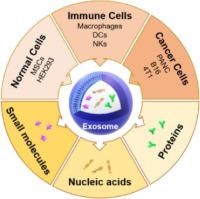Chinese Chemical Letters ( IF 9.4 ) Pub Date : 2022-05-14 , DOI: 10.1016/j.cclet.2022.05.022 Tianqi Wang , Yanan Fu , Shengjie Sun , Chenyi Huang , Yunfei Yi , Junqing Wang , Yang Deng , Meiying Wu

|
Exosome, which is a kind of extracellular vesicles with size around 40-160 nm, plays an important role in cell-to-cell communication in multiple diseases. Especially in tumor microenvironment, exosomes are the important pathway to transit proteins, nucleic acids and small molecules between different kinds of cells. Based on these characteristics, exosomes are served as both therapeutic agents and drug delivery systems in cancer therapy. In this review, the applications of exosomes as drug delivery systems in cancer therapy were summarized and classified according to the cell source of the exosomes, including normal cells, immune cells and tumor cells. Different modifications of exosomes and drug loading methods were presented. Finally, some challenges that hindered the clinical translation of exosomes were also discussed.
中文翻译:

基于外泌体的药物递送系统在癌症治疗中的应用
外泌体是一种大小约为40-160 nm的细胞外囊泡,在多种疾病的细胞间通讯中起着重要作用。特别是在肿瘤微环境中,外泌体是在不同种类细胞之间转运蛋白质、核酸和小分子的重要途径。基于这些特性,外泌体在癌症治疗中被用作治疗剂和药物递送系统。本综述根据外泌体的细胞来源,包括正常细胞、免疫细胞和肿瘤细胞,对外泌体作为药物递送系统在癌症治疗中的应用进行了总结和分类。提出了外泌体的不同修饰和药物加载方法。最后,还讨论了阻碍外泌体临床转化的一些挑战。





















































 京公网安备 11010802027423号
京公网安备 11010802027423号